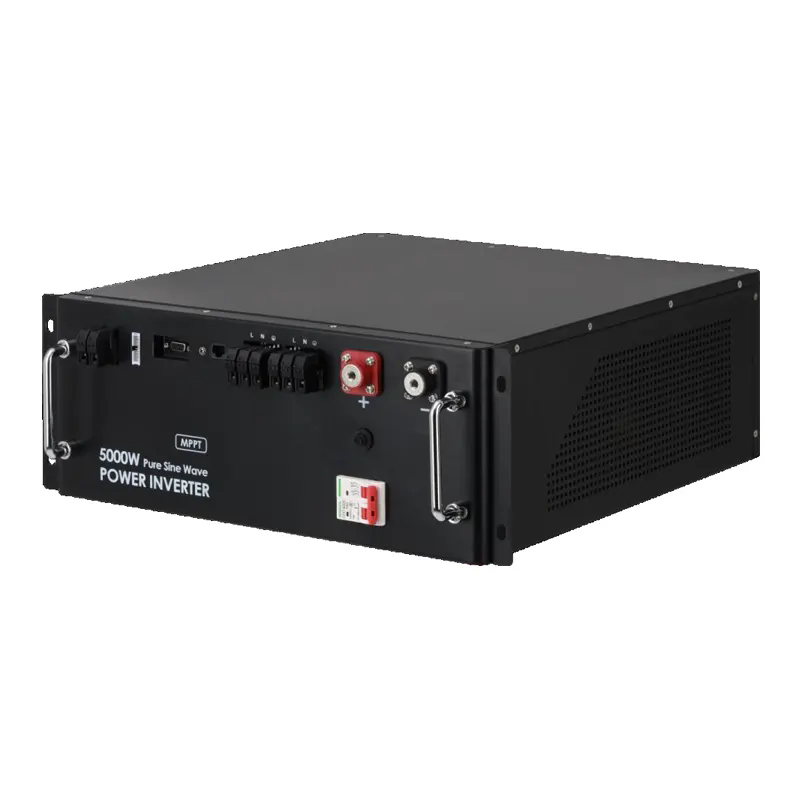Benefits of Rack Mount Solar Inverters
2024-07-15
Rack mount solar inverters are a critical component in solar power systems, converting direct current (DC) generated by solar panels into alternating current (AC) used by most household and industrial appliances. Here’s a detailed overview of rack mount solar inverters, their types, benefits, and considerations for installation and use.
Overview
Rack mount solar inverters are designed to be installed in standard equipment racks, typically in a centralized location within a solar power system. This setup allows for efficient space utilization, easy access for maintenance, and organized cable management.
Types of Solar Inverters
1. String Inverters:
- Usage: Commonly used in residential and commercial installations.
- Design: Connects a series of solar panels (a string) to a single inverter.
- Benefits: Cost-effective, easy to install, suitable for installations with minimal shading.
2. Central Inverters:
- Usage: Ideal for large-scale commercial or utility installations.
- Design: Connects multiple strings of solar panels to a single, high-capacity inverter.
- Benefits: High efficiency, reduced number of inverters needed for large installations.
3. Microinverters:
- Usage: Typically used in residential installations with shading issues or complex layouts.
- Design: Each solar panel has its own inverter.
- Benefits: Maximizes power output from each panel, excellent performance in shading conditions.
4. Hybrid Inverters:
- Usage: Suitable for systems with energy storage (battery) solutions.
- Design: Combines solar inverter and battery inverter functionalities.
- Benefits: Manages both solar power generation and energy storage, can operate in grid-tied or off-grid modes.
Benefits of Rack Mount Solar Inverters
1. Space Efficiency:
- Designed to fit in standard equipment racks, optimizing space utilization.
- Allows for centralized installation in server rooms or dedicated enclosures.
2. Ease of Maintenance:
- Centralized location simplifies access for monitoring, maintenance, and repairs.
- Organized cable management enhances safety and tidiness.
3. Scalability:
- Easy to add more inverters as the system expands.
- Rack mount design supports modular growth of the solar power system.
4. Enhanced Cooling:
- Racks often come with integrated cooling solutions, ensuring optimal operating temperatures for the inverters.
5. Professional Aesthetics:
- Provides a clean, professional look, especially important for commercial installations.
Considerations for Installation and Use
1. Rack Selection:
- Ensure the rack is sturdy and designed to support the weight and dimensions of the inverters.
- Consider racks with built-in cooling and cable management features.
2. Cooling and Ventilation:
- Proper ventilation is essential to prevent overheating and ensure efficient inverter operation.
- Install racks in well-ventilated areas or use active cooling systems if necessary.
3. Electrical Compatibility:
- Verify that the inverter’s input and output specifications match the solar panels and electrical system.
- Ensure compatibility with local grid requirements and standards.
4. Monitoring and Management:
- Many rack mount inverters come with monitoring capabilities for real-time performance tracking.
- Integrate with monitoring systems to track energy production, system health, and identify issues promptly.
5. Safety and Compliance:
- Follow all local electrical codes and regulations during installation.
- Use appropriate safety gear and precautions to prevent electrical hazards.
6. Professional Installation:
- Consider hiring professional installers with experience in solar power systems and rack mount installations.
- Proper installation ensures optimal performance and longevity of the system.
Leading Brands and Models
Some leading brands in the rack mount solar inverter market include:
1. SMA Solar Technology: Known for high-quality, reliable inverters suitable for various applications.
2. SolarEdge: Offers advanced inverters with power optimization and monitoring features.
3. Fronius: Provides efficient and durable inverters with innovative cooling solutions.
4. Huawei: Delivers smart, scalable inverters with integrated monitoring capabilities.
5. Delta: Known for energy-efficient inverters designed for large-scale installations.
Conclusion
Rack mount solar inverters are a practical solution for both residential and commercial solar power systems. Their design offers significant advantages in terms of space efficiency, ease of maintenance, and scalability. By considering factors such as rack selection, cooling, electrical compatibility, and professional installation, you can ensure a reliable and efficient solar power system that meets your energy needs.



